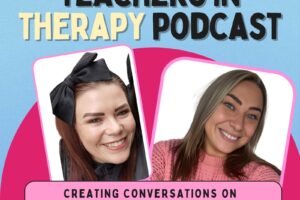Teacher’s Time Out
- Categories Back To School Tips, Teacher Tips & Tricks
- Date January 11, 2024

Last year the I.N.T.O. published their findings from a survey that researched primary teacher wellbeing.
A staggering (but not surprising) 90% of respondents reported that they are struggling with the primary teaching profession. Some words used to describe their overloaded working conditions included “hectic”, “stressful” and “demanding”.
With that in mind, the World Health Organisation has previously defined burnout as “a syndrome…resulting from chronic workplace stress that has not been successfully managed” (2019). It is no surprise, therefore, that burnout is being experienced by teachers across Ireland.
Curricular and extra-curricular workload has been identified as the most powerful predictor of burnout, with stress associated with classroom management not far behind (Fitzgerald, 2020). Compassion fatigue amongst teachers is also often a contributing factor to their exhaustion, as a result of being the compassionate figure for 25 children every day.
As a teacher you might not have much control over the work that comes your way, however, we can become aware of the signs and symptoms of burnout and act accordingly to prevent it.
The primary warning signs that signal the onset of burnout are:
- Physical and emotional exhaustion
- An increased negative and cynical approach to your job
- Reduced professional capacity or competence.
If these symptoms are familiar to you, consider the following tips to help you to realign:
- Include regular physical activity. It is the standard suggestion for many ailments because it cannot be underestimated. Lower levels of burnout have been predicted from increased physical activity (Fitzgerald, 2020).
- Consider the impact of extra work/responsibility before accepting it. Ask yourself if it is really going to make a difference to your pupils’ learning and consider the impact on your own time and wellbeing. Is this the most beneficial way I can spend my time? It’s absolutely fine to say “no”.
- Don’t connect your school email to your phone.
- Have your Aladdin notifications switched off on your phone. If it is an emergency you can be contacted by your phone number, if it’s not then it can wait until the next day.
- Look at your week and if you need to stay late pick one day to do so and commit to leaving on time every other day. Make sure you’re staying late because you have to, not because you feel like you should.
- It might sound obvious, but take your sick days when you are sick. As the saying goes, you can’t pour from an empty cup. You’re a teacher, it doesn’t make you superhuman. You deserve rest and reset as much as anyone.
- It might be the last thing you feel like doing, but trust me I have realised this works wonders! Have something planned for your Friday evening so you can switch off from work as soon as the weekend starts. Even if it’s just visiting family or having a takeaway and watching a movie.
- Spend time with friends and family who aren’t teachers. As invaluable as colleagues are, it can be overwhelming to always be around fellow teachers because you can struggle to remove yourself from your work life. Being around people from different professions can be fantastic to gain perspective and help you to detach from your job.
- When possible, go away for school holidays. If you’re anything like me and find it hard not to work when you’re at home then remove yourself from the situation.
- Reframe your thoughts. This won’t work all the time, but it can be so effective as a cognitive behavioural technique. The next time you’re feeling frustrated about demands being placed on you ask yourself “is this a chore or is this a privilege?” It is always a privilege to teach young children, sometimes we just need a little reminder. That is also a great question to ask yourself if you’re in a bit of a rut and suddenly you’re so used to being stressed and overwhelmed that it becomes your default or habit.
These are the 3 techniques I advise clients to implement if they’re feeling the onset of burnout:
- Set a strict time limit for how long you agree to engage in high-stress situations. For example, when I was studying my masters in coaching whilst also teaching full time I told myself I will have this year of feeling pushed to my limit, because there is no other way of getting the course and my job done, but once my thesis is submitted I’m taking 3 months away from it all. Similarly, in school I always found it helpful to make an agreement with myself that September/October will be chaotic, but as soon as I return from Halloween midterm I work at a sustainable, manageable pace.
- Set strict free time for yourself. This is something that I actually have to do most weeks, even without working in constant high levels of stress. Figure out your non-negotiables and stick to them. For example, maybe walking your dog every evening is non-negotiable. If that means leaving work without changing your display board so you get home while it’s still bright enough to walk your dog then do that. Your dog will be thrilled and you’ll feel so much better for it!
- Have patience with yourself when you come out the other end of your high-stress situation. Your body and mind have been pushed to their limits, they deserve the time it takes to recuperate.
If you would like guidance in establishing any of the above steps, you can contact me for a free chemistry call on Zoom where we can discuss your situation and my coaching services. My coaching is solutions-focused, using positive psychology strategies and cognitive behavioural coaching techniques. I practice in accordance with the EMCC guidelines for coaches and I have experience working as a primary school teacher, so you can rest assured that I definitely understand where you’re coming from when it comes to the struggle between burnout and balance.
Email: hellolifeandstylecoach@gmail.com
Instagram: @clairejameson_thelifestylecoach

Simple Ways Teachers Can Introduce UDL to Their Teaching
UDL aims to create expert learners who are purposeful and motivated, resourceful and knowledgeable, strategic and goal-centered. So why talk about UDL now?

5 Things Teachers Need to Know About UDL
UDL aims to create expert learners who are purposeful and motivated, resourceful and knowledgeable, strategic and goal-centered. So why talk about UDL now?

Learning to Play; Playing to Learn – Integrating Play into the Primary Classroom
– Online EPV Course
– On-demand
– Tutor Support
– Practical
– Lifetime Access

Universal Design for Learning (UDL)
– Online EPV Course
– On-demand
– Tutor Support
– Practical
– Lifetime Access

Supporting the Teaching & Learning of EAL Students
– Online EPV Course
– On-demand
– Tutor Support
– Practical
– Lifetime Access

Supporting Students with Challenging Behaviour
– Online EPV Course
– On-demand
– Tutor Support
– Practical
– Lifetime Access
You may also like

New: Teachers in Therapy Podcast

Back to School Tips for Teachers



